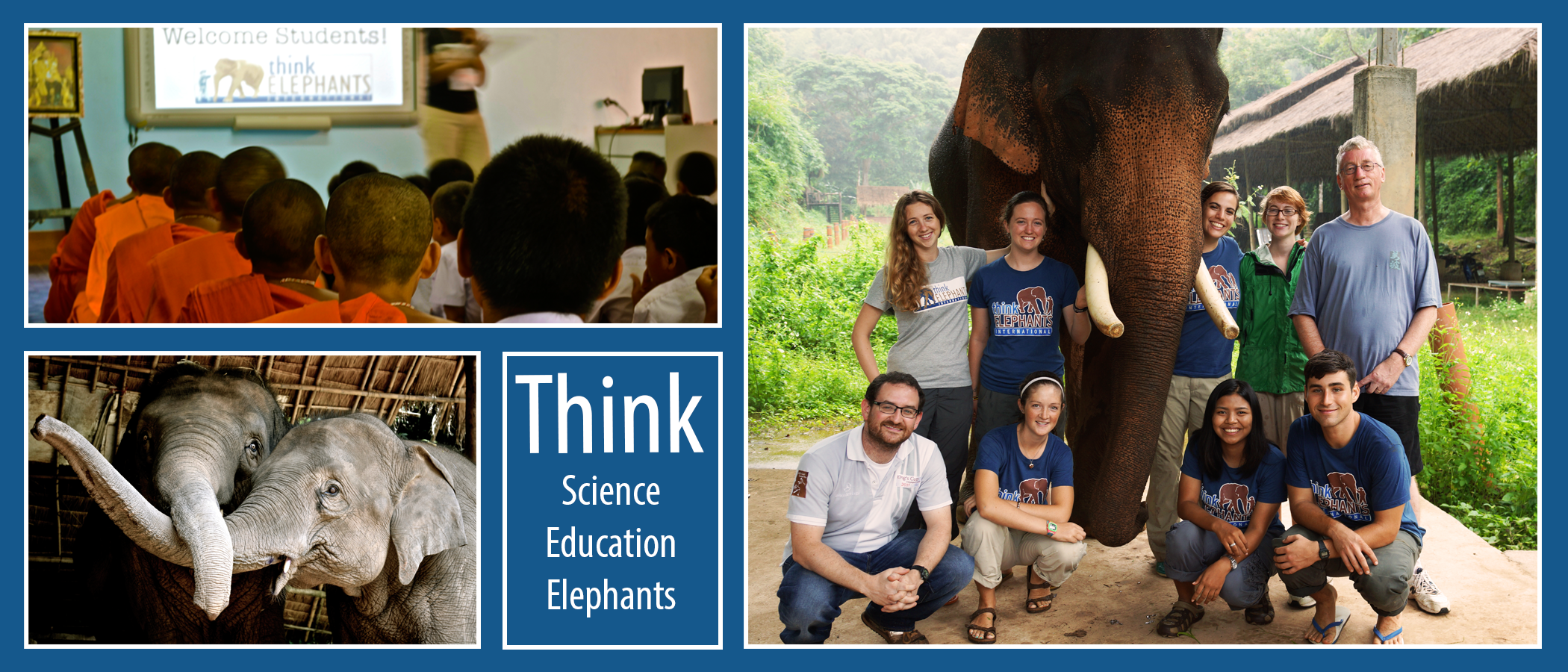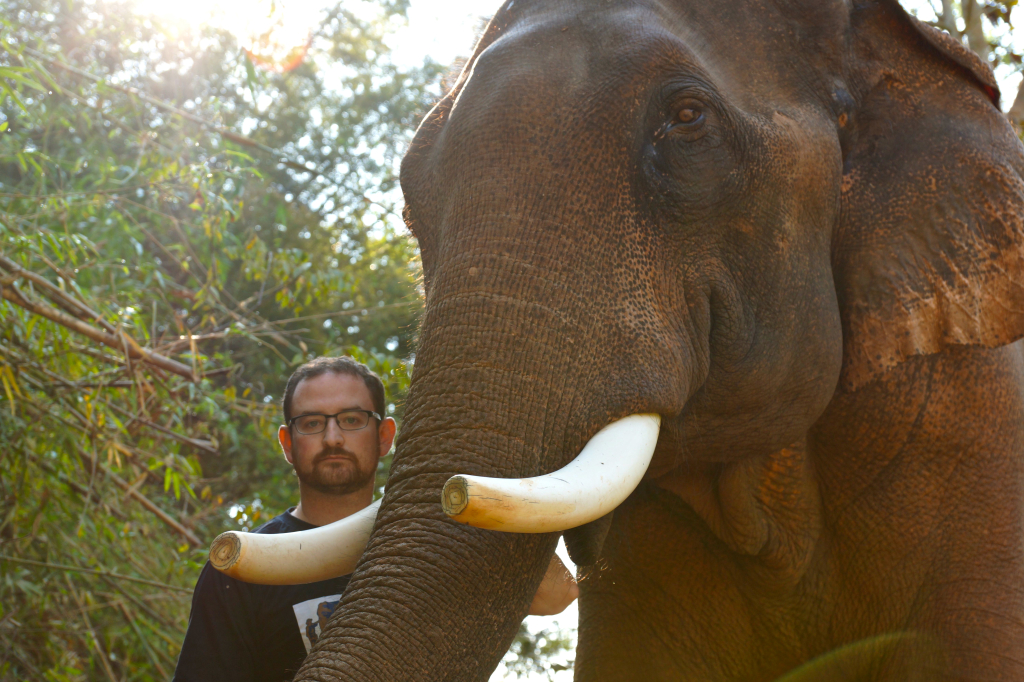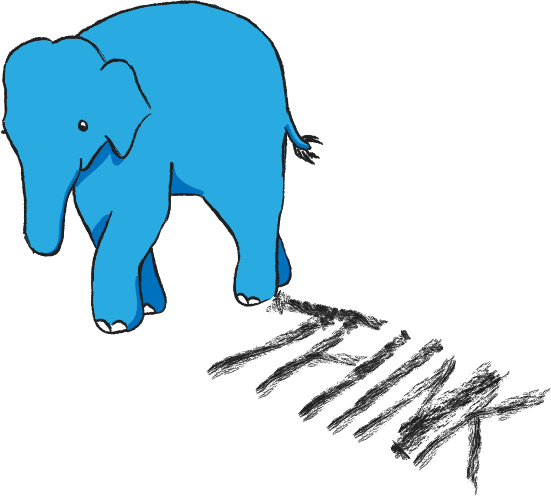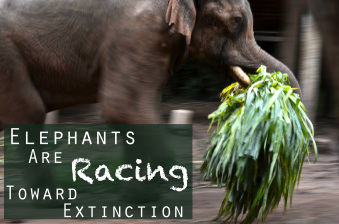
How TEI Came To Be: Josh’s Story
When I saw Happy the elephant at the Bronx Zoo reach up and touch the white X on her forehead in front of a giant jumbo mirror, demonstrating she was self-aware, I knew I was hooked. With the support of my PhD mentor, I went to Thailand in 2007 to start studying how elephants console and cooperate with each other. At the time, I had no idea I’d set up a non-profit or continue my relationship with the elephants of Thailand for the better part of a decade. Since the beginning of my study of elephants, I have studied their capacity for self-awareness, empathy, cooperation, and problem solving. One day, while working with a group of children in northern Thailand, I realized the fight to protect elephants and other endangered species needed a new focus in classrooms.
 We founded Think Elephants in 2011 to help us take a unique perspective on conservation by using the study of elephant behavior to educate children. Current conservation efforts need a renewed focus on changing the way young people, and thus future consumers and leaders, think about the environment and these animals. We are Think Elephants, and we are here to try to affect that change through compromise, fieldwork, and friendship.
We founded Think Elephants in 2011 to help us take a unique perspective on conservation by using the study of elephant behavior to educate children. Current conservation efforts need a renewed focus on changing the way young people, and thus future consumers and leaders, think about the environment and these animals. We are Think Elephants, and we are here to try to affect that change through compromise, fieldwork, and friendship.
-Dr. Joshua Plotnik
TEI Mission Statement
Think Elephants International strives to promote elephant conservation through scientific research, educational programs, and international collaborations. TEI operates by enlisting the expertise of scientists and educators working in diverse fields who are committed to the conservation of elephants and other animals through (1) scientific research intended to aid in conservation efforts for elephants and other wildlife, (2) pre-college education programs designed to impassion the next generation with critical thinking skills and an understanding of environmental issues, and (3) partnerships with other conservation organizations in order to collaboratively tackle relevant issues. TEI is dedicated to using the elephant as a means of connecting the public to broader conservation topics, and inciting in individuals an admiration for all wildlife.

TEI Key Principles

- Asian elephants are severely endangered, and only through global collaboration and coordination between scientists, educators, politicians, and the public will any substantial effort to save them be successful.
- Research on elephant behavior and cognition provides a unique perspective for tackling conservation issues that must address the often-conflicting needs of humans and animals.
- Effectual long-term conservation practice requires proper education for the next generation. Young people both within and outside of elephant range countries can make a difference if given the opportunity through research and practical conservation participation. Anyone in the global community can have a positive impact.
Meet the Team
Jennifer Pokorny, Ph.D.
Chief Programs Officer

Jennifer Pokorny, Ph.D.
Jen manages TEI’s educational programming initiatives, from developing curriculum and supervising and training educators, to evaluating the efficacy of TEI programs. Having taught students from elementary school through the undergraduate level, she is passionate about science education and raising scientific literacy by using interactive techniques, such as problem-based learning, to motivate children to explore and investigate the world around them. Jen received her PhD in Psychology from Emory University in 2009 and has a BA from University of Wisconsin-Madison. Her research background is quite diverse, spanning areas such as systems neuroscience, animal behavior, developmental cognitive neuroscience, and the contemplative sciences.
Matthew Plotnik
Head of Marketing and Strategic Partnerships

Matthew Plotnik
Matt is currently the director of global marketing for Apple Music, Apple Podcasts and Shazam at Apple in California, where he has worked since 2015. Previously, Matt worked on music partnerships and marketing for the eastern U.S. for Twitter. Matt also had experience as a senior director on the digital marketing team at Sony Music, focusing primarily on the formulation and implementation of fully integrated interactive marketing plans for all of Sony Music’s international priority artists. He worked at Sony Music for over five years, and in that time, rose through the ranks to become one of the company’s youngest marketing directors. He was one of only five applicants to be chosen for Sony Music’s highly selective management development program and the only one of the five applicants to secure an executive level position at the end of the program. He has his BA from the University of Southern California and an MBA from New York University’s Stern School of Business. Matt contributes to all marketing, social media and business development initiatives for TEI.
Thitibon “Cherry” Plotnik, D.V.M.
Head of Elephant Affairs

Thitibon “Cherry” Plotnik, D.V.M.
Cherry first decided she wanted to be an elephant veterinarian while interning at the Thai Elephant Conservation Center in Lampang, Thailand during her vet school studies at Chulalongkorn University in Bangkok. Graduating in 2008, she left her hometown of Bangkok to work as the senior veterinarian for the Golden Triangle Asian Elephant Foundation in Chiang Rai. There, she was responsible for the care of more than 30 elephants, but also found time to help TEI with its elephant research projects. Most recently, Cherry was senior veterinarian for the Treasure our Elephants Fund Foundation, which has been working tirelessly to develop and coordinate the implementation of new Thai laws on the regulation of elephant ivory, animal welfare and elephant management. She helps TEI with all matters “elephant” and is interested in helping us to better educate people around the world about elephants.
Board
Joshua Plotnik, Ph.D.
President and Executive Director

Joshua Plotnik, Ph.D.
Josh founded TEI in 2011 with an initial meeting with a NYC middle school principal, a friend of his since childhood. Currently, Josh is associate professor of psychology at Hunter College, City University of New York, and directs both the comparative cognition for conservation lab and the animal behavior and conservation graduate programs. He has published his elephant intelligence research in some of science’s top peer-reviewed journals, and has had his work covered by more than 300 media outlets since 2006. He has an MA and a PhD from Emory University, and a BS from Cornell University. Josh serves as both President of the Board and Executive Director of TEI, and oversees all administration, staff and programs.
Carly Anderson, CPA
Director and Treasurer

Carly Anderson, CPA
Carly Anderson is a senior financial services consultant with years of expertise in providing consulting, valuation, accounting, audit and assurance services and risk management for investment managers, advisors, private equity funds, hedge funds, fund of funds and other financial institutions. Carly’s diverse financial and accounting background makes her well-suited as the Treasurer for Think Elephants International. She is experienced in financial statement preparation and analysis, recalculation and analysis of management fees, carried interest/waterfall calculations, capital calls, distributions, partners’ capital balances, financial highlights and valuations. Carly is currently the director of finance and chief compliance officer at Grafine Partners in NYC. Previously, she held positions as a manager at Deloitte & Touche LLP in the investment management and audit division, and as a senior financial services consultant at Constellation Investment Consulting. She received her B.S. Honors Degree in Accounting with a double minor in Economics and Management Information Systems from the University of Delaware. She is a New York State Certified Public Accountant.
Shauna Leven, Esq.
Director and Secretary

Shauna Leven, Esq.
Since 2021, Shauna Leven has been the CEO of Twins Trust in the United Kingdom. Previously, she was Director of Anti-Corruption Campaigns at Global Witness. Before joining Global Witness, Shauna most recently served as the Executive Director of the René Cassin Foundation, a London-based human rights advocacy and campaigning organization. Prior to that she worked as a Legal Advisor to the Government of Liberia, in Monrovia, Liberia and in litigation at McGuireWoods LLP in New York, USA. Shauna holds a Juris Doctor from Emory University School of Law in Atlanta, Georgia and degrees in International Relations and Economics from the University of Virginia in Charlottesville, Virginia.
Nickolaus Sackett, Esq.
Director and Chair

Nickolaus Sackett, Esq.
After graduating from Tulane Law School and a decade of practicing tax law and corporate litigation, which included work for clients such as Samsung, AMD, Home Depot, and MassMutual, Nickolaus has turned his focus towards conservation and animal welfare issues. Following a 2014 chance meeting with Josh in Thailand while volunteering at an elephant sanctuary, Nickolaus returned to the U.S. determined to leverage his legal skills for the benefit of animals worldwide. Working with various non-profits since, Nickolaus has met directly with USFWS officials and New York and California state legislators in the course of his advocating efforts for elephants, dogs, and bobcats. Nickolaus has a Master’s degree in Management and Conservation of Species in Trade from UNIA in Spain. Currently, Nick is Director of Legislative Affairs at Social Compassion in Legislation in Sacramento, CA.
